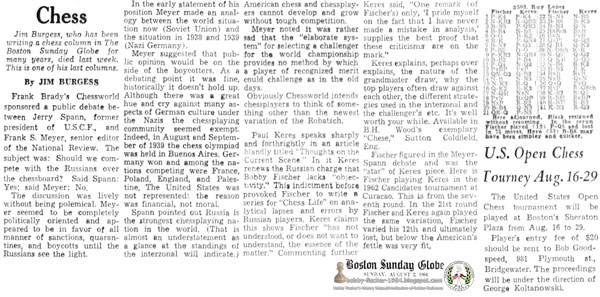The Boston Globe Boston, Massachusetts Sunday, August 02, 1964 - Page 59
Jim Burgess, who has been writing a chess column in The Boston Sunday Globe for many years, died last week. This is one of his last columns.
Paul Keres vs. Bobby Fischer on Grandmaster Draws
By Jim Burgess
Frank Brady's Chessworld sponsored a public debate between Jerry Spann, former president of U.S.C.F., and Frank S. Meyer, senior editor of the National Review. The subject was: Should we compete with the Russians over the chessboard? Said Spann: Yes; said Meyer: No.
The discussion was lively without being polemical. Meyer seemed to be completely politically oriented and appeared to be in favor of all manner of sanctions, quarantines, and boycotts until the Russians see the light.
In the early statement of his position Meyer made an analogy between the world situation now (Soviet Union) and the situation in 1938 and 1939 (Nazi Germany).
Meyer suggested that public opinion would be on the side of the boycotters. As a debating point it was fine, historically it doesn't hold up. Although there was a great hue and cry against many aspects of German culture under the Nazis the chessplaying community seemed exempt. Indeed, in August and September of 1939 the chess olympiad was held in Buenos Aires. Germany won and among the nations competing were France, Poland, England, and Palestine. The United States was not represented: the reason was financial, not moral.
Spann pointed out Russia is the strongest chessplaying nation in the world. (That is almost an understatement as a glance at the standings of the interzonal will indicate.) American chess and chessplayers cannot develop and grow without tough competition.
Meyer noted it was rather sad that the “elaborate system” for selecting a challenger for the world championship provides no method by which a player of recognized merit could challenge as in the old days. Obviously Chessworld intends chessplayers to think of something other than the newest variation of the Robatsch.
Paul Keres speaks sharply and forthrightly in an article blandly titled “Thoughts on the Current Scene.” In it Keres renews the Russian charge that Bobby Fischer lacks “objectivity.” This indictment before provoked Fischer to write a series for “Chess Life” on analytical lapses and errors by Russian players. Keres claims this shows Fischer “has not understood, or does not want to understand, the essence of the matter.” Commenting further Keres said, “One remark (of Fischer's) only, ‘I pride myself on the fact that I have never made a mistake in analysis,’ supplies the best proof that these criticisms are on the mark.”
Keres explains, perhaps over explains, the nature of the grandmaster draw, why the top players often draw against each other, the different strategies used in the interzonal and the challenger's etc. It's well worth your while. Available in B.H. Wood's exemplary “Chess,” Sutton Goldfield, Eng.
Fischer figured in the Meyer-Spann debate and was the “star” of Keres piece. Here is Fischer playing Keres in the 1962 Candidates tournament at Curacao. This is from the seventh round. In the 21st round Fischer and Keres again played the same variation, Fischer varied his 12th and ultimately lost, but below the American's fettle was very fit.
Here adjourned, Black resigned without resuming. In the rerun Fischer played (12) P-Q5 and lost in 73 moves. Here (33) B-B8 may have been simpler and quicker.
The United States Open Chess Tourney Aug. 16-29
The United States Open Chess tournament will be played at Boston's Sheraton Plaza from Aug. 16 to 29.
Player's entry fee of $20 should be sent to Bob Goodspeed, 981 Plymouth St., Bridgewater. The proceedings will be under the direction of George Koltanowski.























